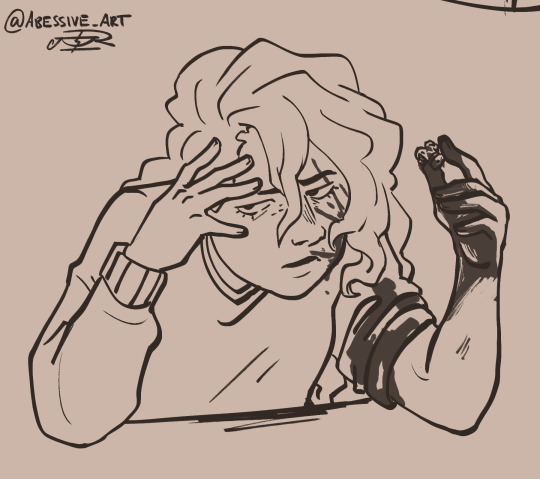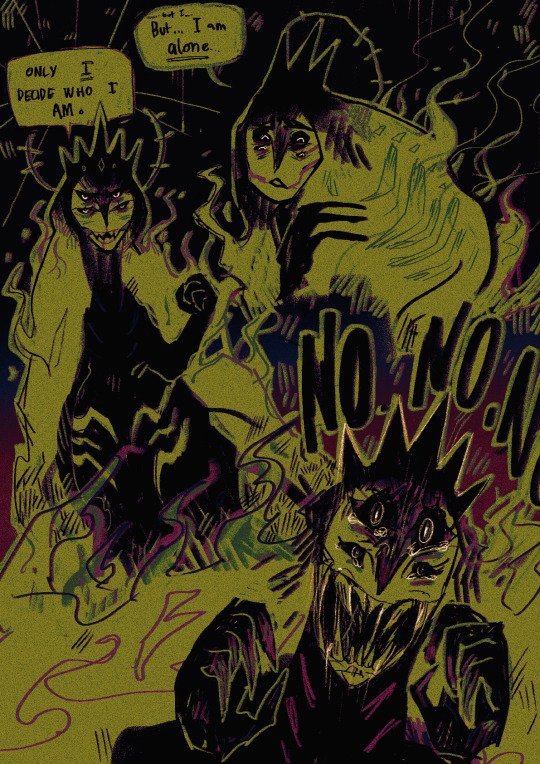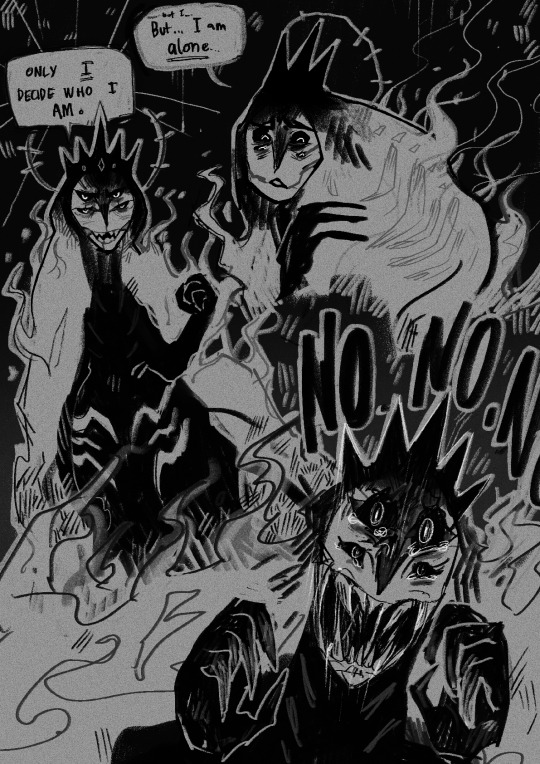#podcast about nothing
Explore tagged Tumblr posts
Text
We don’t talk enough about how Martin was likely mostly running the institute by himself (cuz Peter probably wasn’t all that helpful, Martin for sure never wants to see a spreadsheet again) while in a depressive episode AND manipulating Peter to make him think he’s on his side. Like holy fuck bro. It pisses me off when people act like he’s dumb because did we listen to the same show??
#I think about this like all the time#he does not get enough credit for all the shit he did honestly#plus he was keeping the institute safe from attacks#AND HE WAS TRYING TO PREVENT PETER FROM FUCKING VANISHING PEOPLE#and people still treat him like nothing but a sad puppy like OH MY GODDD#sorry guys he means a lot to me#tma martin#martin k blackwood#martin blackwood#the magnus archives#tma podcast#magnus archives#magpod#tma#milo ramblings
2K notes
·
View notes
Text
Thinking back to the time I was about halfway through TMA and was explaining the plot to a friend who has never listened to a single episode and they tried to make one of those "Soup was invented by John Soup when he wanted to drink a chicken" jokes and ended up saying something along the lines of "The Magnus Institute was created by John Magnus when he wanted to make an institute for all the fears" and at the time I was like haha good one bro but in hindsight I think I need to fucking throngle them with my bare hands
#I actually could not make this shit up if I tried#I didn't even know about Jonah Magnus at the time I was just like haha good one bro#I didn't even tell them that Jonah Magnus was a person they just made it up#pretty sure they're plagued by visions#they knew literally nothing about the podcast they knew that it was an institute for archiving paranormal experiences and knew abo#about smirke's 14 and that's it#TMA#the magnus archives#magpod#jonah magnus#TMA spoilers
3K notes
·
View notes
Text




*Archives your Magnus*
#the magnus archives#tma#jonathan sims#martin blackwood#melanie king#basira hussain#daisy tonner#fanart#alice tma#tarantula#PLEASEEEEE PLease please please I love them so much this relisten is wrecking me#messing with my brain so bad i start thinking about tma and my heart n brain get scrambled#(i am very normal about media)#This podcast means sm to me :´) im so glad I came back to it <3#I have nothing new to say about the podcast i.e. literary analysis but oh man i am enjoying the hell out of it#makes me feel happy#myart
2K notes
·
View notes
Text
I really love gertrude robinson bc how often do you get an older woman character who just really sucks? She sacrifices ppl that trust her. She is so focused on keeping the world from ending that she completely doesn’t notice one of her assistants routinely torturing the others. She dismembered a guy. She does her job badly on purpose. She’s cunning and sneaky. She dares her murderous, immortality seeking boss to kill her. She gets murdered by her murderous, immortality seeking boss. She’s not particularly friendly. She somehow had access to plastic explosives. She’s a manipulator and a liar. She’s bound to the avatar of destruction. She helped a guy get rid of a pig by telling him to put it in conk crete. She is like the opposite of a sweet little grandma and that’s beautiful.
#tma#tma spoilers#the magnus archives#gertrude robinson#I don’t think I’ve ever seen a fanon interpretation of her being kind and motherly#and that’s sooooo amazing to me#bc female characters (esp older ones)#are so often relegated to being the mom friend or some similar trope that completely ignores their personality#so I love that she gets to be just the most morally gray old woman#with an amazing voice#ever#tma podcast#what if I fell in love with her#what are you gonna do about it?#nothing!!#you can’t!#can’t wait to be sacrificed <333
2K notes
·
View notes
Text






David Tennant - Throwing his Head Back with Laughter - Part Four
[ Part One ] [ Part Two ] [ Part Three ]
#david tennant#joyous laughing david#head thrown back laugh#featuring guest appearances by#ncuti gatwa#michael sheen#catherine tate#georgia tennant#doctor who#good omens#much ado about nothing#hignfy#bafta 2024#happy place podcast#he had the best laugh#stuff i posted
502 notes
·
View notes
Text
sometimes i find myself thinking 'glenn wasn't a bad dad, he was a guy doing his best to make his kid happy with absolutely NO example and a lot of his bad decisions were out of love for nick' and then i actually go back and listen to the podcast
#ramble#dndads#dungeons and daddies#glenn close dndads#@ freddie we need to talk you're making this hard for me#i finished s2 last night and i have too many thoughts#still drafting my essay about generational trauma. i WILL take this stupid podcast seriously and there's nothing anyone can do about it
329 notes
·
View notes
Text


they should argue far more often than I portray, but I choose to omit it so we don't have divorced couple simulator: the fanfiction
#the magnus archives#tma podcast#the magnus pod#jonathan sims#jon sims#artists on tumblr#elias bouchard#martin blackwood#illustration#tma fanart#fanart#the archivist#pineye au#a fresh pair of eyes#theyre arguing about the color tabs elias is using in his statement notebook#its made so much worse because this argument literally amounts to nothing and its happened at least five times since
764 notes
·
View notes
Text

ep 43 had me tearing up in a fucking shopping centre ‼️‼️
b+w alt version that I truly couldn't decide if I liked it more . Also I included a lot of thoughts in the tags but they're somewhat incoherent<3

#i dont know what i expected but i was waiting for a friend and too excited to wait until later#malevolent podcast#john doe#john doe malevolent#john malevolent#malevolent fanart#grimm art#ep 43#ep 43 left me with a lot of thoughts ... i didnt quite like how much of a recap it felt like at times but that might#be because ive been relistening and like yeah everyone knows that john 🙄 but that's not the case for everyone and with monthly uploads#things get forgotten easily#i find the discussion of “humanity” so interesting because John has shown that without someone that he has forcibly grown to value as an#equal... something he cannot do as the king of yellow as he is superior to all of his realm and presumably stays out of other elder god's#anyway. without that equality and enviroment to grow he fails to reach his goal of compassion and falls onto old ways.#John. The King in Yellow. shown by both times each has found themselves in human form do not just crave power and influence!!!#THEY CRAVE COMMUNITY!!! an endrich being not born or raised with nothing but power and ego#CRAVES COMMUNITY.#His goal of “humanity” is not a selfless goal like John projects - it is ultimately somewhat selfish as he does not want to be alone!!#which makes this desire so much more human#i don't know maybe this is just me spelling out whats already there but the way john and the witch argued about humanity frustrated me#it felt like they were missing the point or that perhaps the “good/evil” “black/white” retoric was already realised by me and john needed#realise it himself . which is fair !!!#i dont know!!!!#the witch was talking about how bad everyone was and how humanity is cruel and john was talking about Lily (#who also frustrates me how shes used in the plot somewhat she was literally just a nurse doing her job bro#) but to John - yes internally he is struggling with his moral greyness and im so proud of him for growing being himself SO PROUD#JUST.!!! he wants community. he needs community. he loves his friend. 'humanity' at its core does not matter as long as you try to be bette#and i think thats awesome and i really enjoyed the episode#guhh im rambling enjoy my tag rambling i dont know i want john to have more friends :(#yorrick can be another friend godd i love you yorrick so silly
221 notes
·
View notes
Text
“in the fell clutch of circumstance” arthur loves the shit out of that poem huh.
#malevolent#arthur malevolent#malevolent podcast#arthur lester#jarthur#john doe#malevolent 47#invictus by henley…#arthur was feeling bad about how quickly he gave in to horig#perhaps uncertain of how in control he is#so he circled back to the poem he finds solace in#the one that says yes you are in control#that nothing can take that from him#that no matter what has happened#under the bludgeonings of chance#that it will find him unafraid#the poem that reassures he is the master of his fate#the captain of his soul#for better or for worse
116 notes
·
View notes
Text

Sweet reward for obeying commands
#THIS PIECE WAS SPONSORED BY THE HOURS OF RESEARCH I DID ON HUMAN HORMONE AND THEIR EFFECTS AND THE 0 REFERENCES I USED FOR THE SERVER TOWERS#ghosts art#SAYER#SAYER podcast#SAYER ai#jacob hale#sayerhale#well kids. lets analyze this piece. what did the author (me) mean by this?#anyways uh this is. something ive drawn. and made. and posted.#if you are thinking to yourself ''this looks intimate'' then yes. you are right.#i also feel like i owe a hand written apology letter to everyone who works in IT. i am NOT a technology nerd. but i AM a human antomy nerd.#anyways!!! role swap!!!!! its now Hale prodding around SAYER's ''brain'' instead of the opposite :)#the filename for this is SAYER_sayerhale objectum nonsense . just a fun silly fact for everyone#because i am aroace towards humans. but i am also very much objectum#i dont know if ill have the balls to post this in the official server . but enjoy#objectum#<- dont worry about it#ALSO PLEASEEEEEE ZOOM IN ON THE DETAILS. IM BEGGING YOU.#MY ASS DID NOT SPEND HOURS DOING ALL THAT RESEARCH FOR NOTHING!!!!#''what exactly are hale's biometric readings telling us about'' decide that for yourself . up for interpretation.
120 notes
·
View notes
Note
Your artstyle makes me want to play minecraft i say this in the nicest way but it gives me a headache how much it makes me want to play minecraft.
I don’t even know how to respond to that
#ask#look at images of the podcast men and they’re like oooooo you wanna play Minecraft soooo baddd#the fact that I post literally nothing about Minecraft makes this so much funnier
107 notes
·
View notes
Text


dissing something phil has made right in front of dan’s face is a wiiiiild move girl the second that camera is off you’re getting killed
#does jack fear nothing#/j#/lh#this was an uncomfortable moment though#but this podcast has been great and hilarious#for the most part#more so it’s been mortifying to be perceived lmaoooo#also no one is safe from hear about their sex life not even two straight gamer boys#basically i’m gay#coming out to you#dnp#dan and phil#phan#not tagging anything related to the other people in this i’m terrified of the mc*t fandom#dan howell#daniel howell#amazingphil#phil lester#dan & phil#d&p#dip and pip#dip n pip#terrible influence tour#coty#big#dnp described#yeet my deenp
56 notes
·
View notes
Text
True knowledge exists in knowing you know nothing || Dr. Ratio & Socrates
Okay, I legitimately laughed out loud writing that title, but listen. LISTEN.
Ratio's inspirations derive from many sources; from referencing Archimedes's brain-blast in the tub, to being doomed to have his head bonked by Newton's apple ad infinitum in his idle animation, to his ultimate line ('esse est percipi' / 'to be is to be perceived') a direct quote from Berkeley on Idealism - it's apparent that his design nods towards scholars across time periods rather than being a direct parallel to a singular academic.
Nevertheless, just for fun, I've been rotating Ratio and ancient greek philosophers around in my head and have had a great time chewing over how parallels Socrates in particular. I am in no way saying that Hoyo even thought about Socrates while they were designing Ratio, but I thought I'd share my thoughts. I think there are some worthwhile parallels to be drawn that touch on all aspects of Ratio's own philosophy regarding ignorance, the value of knowledge, and his deep appreciation of life. So, let's get into it.
Ratio is interested in humanity and curing 'ill minds with knowledge', that 'to turn a blind eye to the folly of others is not an etiquette, but a wicked worldly practice.' Ignorance is a disease - this is a concept that can be viewed through a Socratic lens. Socrates believed that that virtue and knowledge were impossible to separate from one another, and that virtue could be developed through acquiring knowledge and insight. If knowledge is virtue, then ignorance is vice. In Socrates's mind, no one would rationally choose to do something bad. People might choose to do bad things, but this is rooted in their own perception of the world - as in, someone would only choose to do something bad (for the world, or for themselves) because they believed (erroneously) that it was the right or good thing to do. To Socrates, the cure to this was knowledge: 'There are two kinds of disease of the soul, vice and ignorance.' & 'What does most harm in the world is not sinfulness but ignorance'.
To Ratio, 'If ignorance is an ailment, it is the duty of the scholars to weed it out and heal the universe'. He views his own ignorance as 'filth' that must be cleansed through methods such as reading. He also views knowledge as a method for humans to overcome their problems - 'Another day has passed. If your problem still hasn't been solved, is it possible the problem is you?' & 'You look distressed. Is something troubling you? if so, you can figure it out for yourself.' These statements sound harsh, but they also clue us into Ratio's philosophy - that through self-examination and improvement, one can overcome one's ailments.
Socrates was also known for being a trouble-maker, he was abrupt and tactless and did not care for someone's social standing nor decorum. He was also known for using what is now called the Socratic method, asking a series of questions that ultimately seek to show contradictions in the beliefs of those who posed them, and to move systematically towards a hypothesis free from contradiction. Socrates rarely made assertions himself - after all, he had no wisdom of his own. But he could interrogate others in order to expose their own foibles, much to the embarrassment and annoyance of those around him. He was once described as a 'gnat' chewing on the 'lazy horse of Athens', causing it to wake up and spring to life due to his persistent gnawing and prodding. Ratio also employs the Socratic method - 'I'm asking questions' - and also adopts sophist tactics such as playing devil's advocate and taking opposing sides (with both himself as seen a story quest, and with others as we see with his texts urging us to take up a side so he might debate us). Through questioning and interrogation, upsetting what we consider social convention and norms, we can dispel contradictions and thereby come closer to some form of truth.
To add to this - as highlighted in the replies below - Ratio’s skill ‘intellectual midwifery’ is a reference to the Socratic method. The idea being that Socrates helped those around him give birth to the knowledge that was already within them, rather than treating his students minds as empty vessels for him to fill with his own answers. Again this is beautifully echoed in Ratio - he doesn’t want to tell you how to live your life, he wants you to work out for yourself what it is you need, thus empowering oneself through self-examination and questioning.
Socrates did not believe in writing anything down. He believed that face-to-face communication was a far more effective way of communicating knowledge - which means, unfortunately, what we know of Socrates is primarily derived from secondary sources. Much of what we know about him today comes from Plato's dialogues, and Plato was known for liberally exercising artistic license.
Although Ratio is not dead, I find it interesting that his character story is told exclusively through secondary sources. To quote - '…There are no less than eight documentaries detailing his legendary exploits, and over a dozen memoirs about him. However, despite the plethora of commentaries, none of them seems to provide a compelling perspective.' It's as though there are no surviving fragments penned by Ratio's hand and all we have to go on is through the lenses of other people. This challenges us, perhaps, to try to think about our own interpretation of Ratio since secondary sources cannot be taken as a wholly unbiased account - and once again employing the Socratic method and empowering the reader to come to their own interpretation.
While Socrates left no writing behind, he was interested in spreading knowledge. Socrates spent most of his life in Athens, a city that was, during his lifetime (~470-399 BC), a hotpot of scholars, wisemen and philosophers. Athena, the Greek god of wisdom, was named after the city - her symbol the owl that is also appropriately perched on Ratio’s shoulder. Also in Athens at this time where the sophists. The sophists were a class of intellectuals who were known to teach courses in various subjects - but often for a high fee, and generally centred around the idea that persuasion and the use of knowledge as a tool was more important than wisdom or truth itself. There's some debate about whether Socrates could be characterised as a sophist himself, but, crucially, he is characterised as refusing to take payment for his teachings. He was born a plebeian (perhaps you might describe it as a mundane background.) He was known to dress in rags and go barefoot, speaking to and (often antagonising) people from all walks of life, preferring the marketplace as a center of debate than palaces or courtrooms. I can't help but think of the sophists as similar to the genius society (or at least Ratio's depiction of them in contrast to himself), cooped up in ivory towers and gatekeeping knowledge to the most privileged. He doubts if Herta's talent is always helpful to others, he compares Screwllum to a 'monarch'. Then again, the sophists may in fact be a bit of a parallel to the Intelligentsia Guild - from Ratio, 'when someone is willing to listen to knowledge that is being disseminated and circulated, a price is created'.
Socrates (or at least the Platonic depiction of Socrates) was at one time declared the wisest man in Athens by the Oracle of Delphi. Socrates balks at this assertion - how can he possibly be the wisest man in Athens when he in fact knows nothing at all? This was not a claim made of modesty - he truly believed that he had no wisdom, that he was unsure what 'wisdom' itself even was. Ultimately, Socrates concludes that the only way that the Oracle could be correct is that by actually acknowledging that he knows nothing he paradoxically is the wisest man in Athens. All wisdom, therefore, is rooted in wondering, with wondering only possible if one is open to admitting one's own ignorance.
What I love about all of this in relation to Ratio is that Ratio styles himself as a mundanite. The Intelligensia Guild advocates that 'all knowledge must be circulated like currency' and accepts 'all beings… who seek to learn'. Ratio has no time for the satisfied self-styling of intellectualism, he himself states that 'to speak knowledge, we must first make people realise their own folly.' No one is above criticism in this regard, even himself - again, to quote 'Whenever someone agrees with me, I feel like I must be wrong.' Again, I feel as though he would resonate with Socrates here: 'Smart people learn from everything and everyone, average people from their experiences, and stupid people already have all the answers'. With Aventurine, he is quick to mock his appearance as over-the-top and vapid - once again making it clear his distate for vanity and hollow displays of showiness (albeit he may have been acting for Sunday's sake here. Also, no comment about this coming from a man who runs around in a toga, lmao) Equally, with Aventurine, it is clear that Ratio is willing to learn from him - he apologises when he offends, he abhors his methodology and yet he still relies upon it and trusts in Aventurine's plan, he is drawn to him in some ways precisely because he is so different to himself. Aventurine (at least styles himself) as impulsive to Ratio's slow and steady methodology, Aventurine whose learning has been entirely self-made vs Ratio who has spent his life in classrooms, Ratio who scoffs at Aventurine's favourite games of chance yet adds slot machines to his simulated universe. And to Socrates, the experience of aporia – in all of its discomfort and disruption – is the very catalyst of wonder, and that wonder was not just the root of wisdom but also the way to live a good and happy life. There is something beautiful in this to me, and this extends to Ratio. Ratio fundamentally cares about life. For all his brashness, his lashing out against 'idiots', his harsh demeanour - he wants people to live good lives, he wants to contribute to the good of humanity - all people, even those he is annoyed by, he cares so profoundly and absolutely about life. The entire reason why he is obsessed with wisdom and learning is not to exalt or elevate himself, not as some kind of ritualistic expression of piety towards a deity, but it is instead an expression of devotion towards life itself. Ratio has a strict work out routine not so that he can show off his body, but because living healthily is living well and working out is a component of that. Even the way he fusses and worries about Aventurine, someone he is pointedly irritated by, reveals how deeply his care runs. So so much of his character is centered on caring for life, even if it is not immediately obvious.
Finally, I'd like to highlight some ways in which Ratio is not like Socrates. First of all, Socrates was repeatedly described as 'ugly' by fellow philosophers Plato and Xenophon - this is contrast to Ratio being repeatedly described as 'handsome'. This is an interesting subversion to me (albeit likely an indulgent one) as in both cases both men attempt to distance their physical appearance from the weight of their words. Ratio wears the bust for many reasons, but way to view it is that he is attempting to stop his appearance from bearing any influence in the subject of debate.
Socrates was also said to be blessed by a divine touch, and as we know, this is something that agonises Ratio as Nous has not yet turned THEIR gaze towards him.
Lastly, Ratio has - thankfully - not yet been ordered by the state to drink hemlock for all his trouble-making and blustering. Though perhaps he may someday be put on trial by the IPC if the theories that he is working alongside Aventurine to undermine the corporation are true - we will just have to wait and see.
Thanks for reading my little ramble. I'd be super interested in anyone's thoughts if they'd like to share, but regardless, I'll leave off on some of my favourite wee quotes from the Rat man:
'Even a life marked by failure is a life worth living - it is only in moments of solitude and despair, when help is absent, that fools grasp how to pick themselves up.'
'Do stay alive. I wish you the best of luck.'
#dr ratio#ratio#aventurine#hsr#honkai star rail#my witterings#i love the rat man so much idk#much of the information i describe about Socrates comes from the podcast History of Philosophy without the Gaps#which I highly recommend if this is your kind of thing lol#but mostly I just wanted to have fun spinning my hyperfixation around lol#Also I make a few declarative statements throughout this but know that I do not claim to be a scholar of greek philosophy lol#please check the verasity for yourselves before relying on what I have to say#for I know nothing u see u see? :P#also I just wanna add in that I do NOT think Ratio is a perfect human being#ratio can be hypocritical and cruel and ignorant just like the rest of us#but I adore that too as afterall he is also an expression of humanity#with all its earthy faults
166 notes
·
View notes
Text
tis the season so im gonna unleash my hottest take on malvolent rn
benevolent has the best twist of any of the episodes.
#malevolent#malevolent podcast#arthur lester#john doe#kayne malevolent#NOTHING matched my shock when i heard ‘cut’#this episode is everything to me#its been a year and i think about her daily#benevolent my beloved#the christmas special ever
105 notes
·
View notes
Text
Nothing will ever hit as hard as that “hello Jon” in 160 tbh
#tma podcast#the magnus archives#mag 160#jonathan sims#elias bouchard#jonah magnus#literally nothing omg#it was the most hype thing in the world tbh??????#omg??????#I’m constantly thinking about it LOL
74 notes
·
View notes
Text
Tma AU where Jonah fucked up his ritual when transferring to Elias’ body and still exists but is like. On the backburner unable to control the body. Because he’s a loser. So OG Elias is able to hear everything he thinks but Jonah can’t do anything. And so he learns the evil plan to end the world and immediately decides nope that’s NOT happening.
And since James Wright appointed him as the next Head of the Institute he has full control over everything he destroys every single bit of Jonah’s carefully laid masterplan. And Jonah suffers seeing everything he’s build fall like a house of cards. At the end Elias just goes and kills Jonah — there were concerns that it may also kill him, but he was ready to sacrifice himself — and comes out alive and free from voyeristic georgian men.
Elias establishes something of a truce with Gertrude after explaining the situation and also perhaps maybe telling her that Jonah mentioned one of her assistants is of the Web and what does that mean? Also what are the rituals and why does Jonah keep saying they don’t work unless you— (Gertrude cuts him off before he says it out loud. Walls have ears. You never know who might be listening).
Michael doesn’t die. Neither does Gerry, because after he faints for the third time at the Institute — Elias doesn’t have spooky eldritch eye powers, but he has office gossip, and that’s basically the same thing — Elias personally goes down to the Archives and tells him to go to the fucking doctor dude. Gerry smokes weed with him after a few months and thanks him for potentially saving his life
By the time Gertrude dies, which is post Stranger ritual (not shot by him, but still probably not peacefully, knowing her) Sasha becomes the next Archivist, and her role in the overall world of the Fears — Elias is not an avatar, doesn’t want to be, but has some leftover traits from Jonah’s inhabitance in his body, and knows a lot — is explained before she signs any contract. Also you’re not tied for life, fuck that. There’s a mandatory Entities 101 for every employee, no matter what department they work in; the vast majority of them come here seeking answers for what really ruined their lives, none of them deserve to die because nobody tells them what they’re actually fighting against. Tim — very much alive — goes to the Archives with Sasha, Jon stays in reaserch and eventually becomes Head Researcher. Martin goes to college part time at some point. Life is good
#tma#the magnus archives#tma podcast#original elias bouchard#he deserves so much better??#jonah magnus#elias bouchard#I have no idea how Jonah could fuck it up so badly so web might’ve been slightly involved#who knows with them#I’ve read fics with the opposite scenario (Elias can do nothing but is still present) but I live for fix its#Elias is in a weird predicament and the avatar community has NO idea what to think about the guy#like fuck you meam the head of the Magnus institute smokes weed on his lunch break and doesn’t even like beholding?#I also like the hc that Elias was on his way to become a web avatar so…#tma spoilers#my tma aus
77 notes
·
View notes